MercoPress. South Atlantic News Agency
Tag: salmon farming
-
Wednesday, May 29th 2024 - 10:50 UTC
Falklands: Consultation work to be undertaken on salmon farming
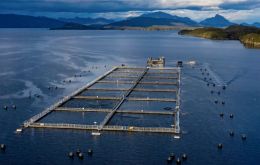
The Falkland Islands Government has agreed to dispose of the claim brought by Unity Marine Limited by mutual consent, and on 27 May 2024, the Chief Justice issued the Order as agreed by the parties. The claim sought to challenge the decision made in March 2022 that arrangements should be put in place to prevent large-scale salmon-farming from proceeding in the Falkland Islands. Amongst other things, the Government had previously given an expectation that there would be a full public consultation on the issue prior to a decision being made. The Government accept that a full public consultation should be held, before a further decision is made on the issue.
-
Thursday, May 25th 2023 - 10:40 UTC
Falklands' salmon farming reignites: application for judicial review
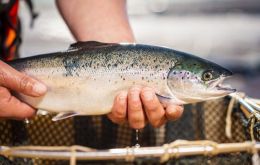
The controversy surrounding the possibility of salmon industrial farming, and its environmental impact, has reignited in the Falkland Islands.
-
Tuesday, July 5th 2022 - 09:50 UTC
Farmed salmon industry booming and has become the main global fisheries export
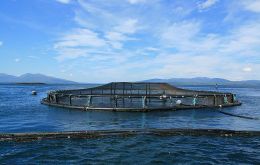
Farmed salmon exports totaled US$ 27.6 billion in 2020, surpassing exports of other categories of fish, according to the latest release of a biennial report from the UN Food and Agriculture Organization (FAO).
-
Monday, April 25th 2022 - 09:30 UTC
UK inflation: Salmon farming company agrees to pay above the real Living Wage, £10.40 per hour
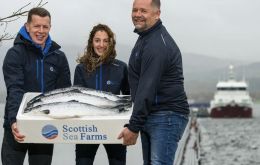
Scottish Sea Farms, now the country’s second-largest producer of farmed salmon, has committed to paying above the real Living Wage in a bid to help those of its employees and their families hit hardest by the soaring cost of living.
-
Tuesday, March 29th 2022 - 10:01 UTC
Several Chilean salmon farming companies reported for contamination
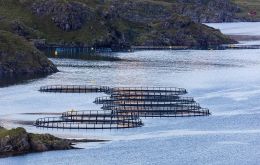
The Chilean Fisheries Department, Sernapesca has confirmed the appearance of garbage on the beaches of Riesco Island, which have been identified as belonging to nearby salmon farms. The companies reported are, Austral S.A, Australis; Blumar; and Magallanes SpA, and have been notified and have ten days to clear the beaches.
-
Monday, November 22nd 2021 - 08:39 UTC
Town in the state of Maine voted a moratorium on salmon farming
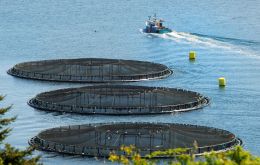
Voters in the town of Gouldsboro, the state of Maine on the US Atlantic coast have placed a moratorium on large-scale fish farms until at least the next boreal spring. The vote took place during a special town meeting.
-
Wednesday, August 25th 2021 - 07:57 UTC
Argentina prosecution sustains Tierra del Fuego bill banning salmon breeding
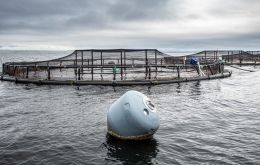
Argentina's Prosecution office considered that the Tierra del Fuego province bill establishing limits, and rulings for the breeding and production of salmon species in provincial jurisdictional waters “do not exceed limits of the reasonable” and besides were approved by the Legislative in “the full exercise of its environmental competence, which privilege the conservation of natural resources above considerations of other nature”.
-
Monday, July 26th 2021 - 04:57 UTC
Tierra del Fuego promulgates bill banning industrial salmon farming
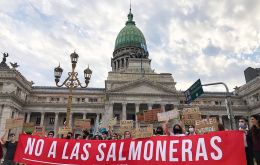
Three weeks after its approval by the local Legislative council of Tierra del Fuego, extreme south of Argentina, the provincial Executive finally promulgated the bill that bans the growth and farming of salmon species in the provincial sea and lakes jurisdictional waters.
-
Tuesday, July 6th 2021 - 09:00 UTC
Magallanes Salmon Association: Tierra del Fuego's decision will have no repercussions for Chilean aquaculture
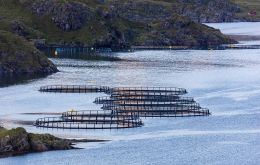
Magallanes Region Salmon Breeders Association Carlos Odebret downplayed the repercussions for the Chilean aquaculture industry of the recent Argentine legislation banning salmon farms in Tierra del Fuego, adding that the industry in Chile has a thirty-year experience and situations are not comparable.
-
Thursday, July 1st 2021 - 09:42 UTC
Tierra del Fuego approves bill banning salmon farming in its waters; Chilean environmentalist groups cheer the decision
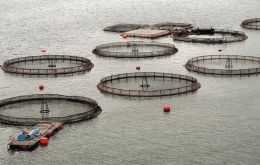
Tierra del Fuego lawmakers on Wednesday approved, unanimously the bill which bans salmon farming in the waters of the province. Sponsored by Pablo Villegas from the provincial party, Movimiento Popular Fueguino, the bill privileges the environment over such an industry, and according to its promoters places Argentina at the head of the green economy.
